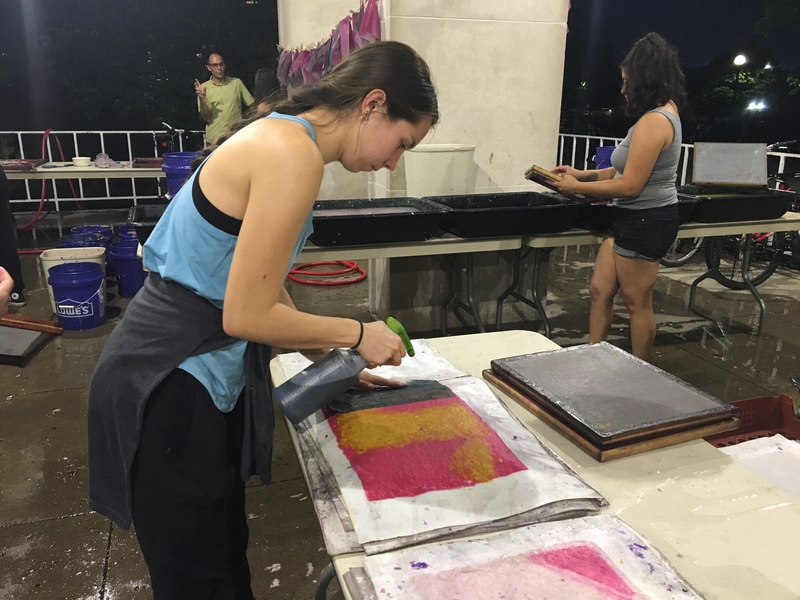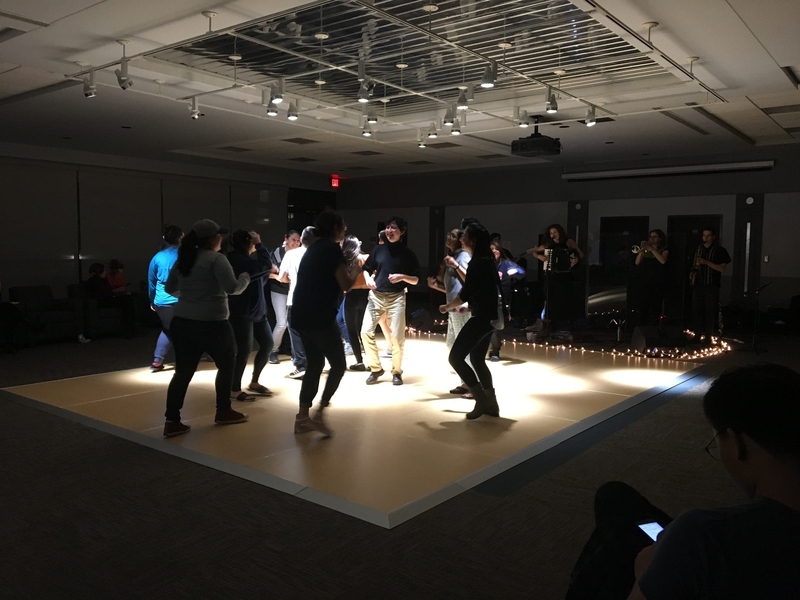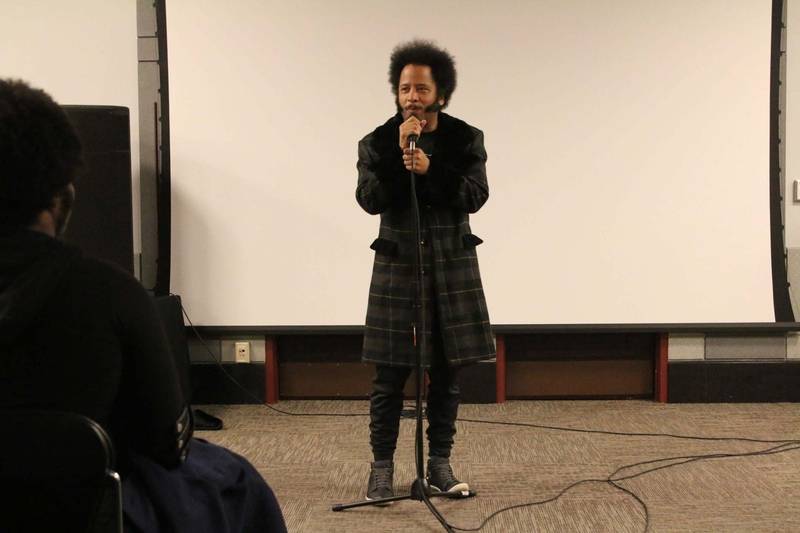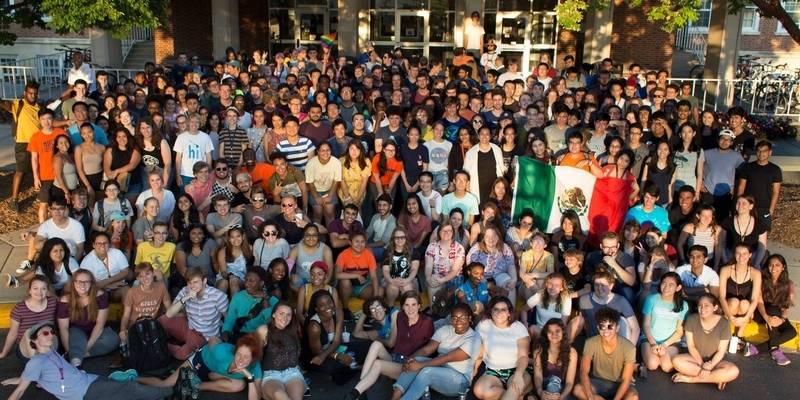With over 40,000 students on campus, the size and scale of the University of Illinois can be daunting for incoming students. I came to campus a…certain number of years ago, and though I was fortunate to have a few high school friends to navigate those first few weeks and months with, it was definitely an exercise in finding a niche that I could carve out to make this place home. As a “six-pack” resident I was vaguely aware of Allen Hall and its Unit One program, but only as a residence hall where you could also take classes. It is, however, so much more than that.
One of the University’s 11 “living-learning communities”, Unit One/Allen Hall provides that niche that so many students are seeking, and strives to scale down the size of the University to a community where students can be engaged and connected with each other as well as their instructors. The program does indeed provide for-credit classes, some that fulfill gen ed requirements, but many of which are unique to Allen Hall and provide opportunities for exploration in other academic areas. Beyond the coursework opportunities, Unit One/Allen Hall offers an immersive learning experience, especially enhanced by their popular Guest-in-Residence program. Smile Politely writer and former Allen Hall resident Serina Tajula learned a bit more about it from Laura Haber, Academic and Program Director for Unit One.
———–
Smile Politely: So, how did Allen Hall get started? How did it become what it is today?
Laura Haber: I’ll do a little mini-history of us, if that’s alright. Unit One started in 1971. We’re actually the oldest and largest living-learning community on campus. Originally, we were just one wing of Allen Hall, and the idea was just to blend living and learning to help get students to be more engaged with their education. There were a lot of times U of I decided they were going to get rid of Unit One, but students protested and held rallies and parents even got involved. So they had to keep us. Because students cared about Unit One so much, enough to protest, the University became convinced that it was something special. The reason we’re called Unit One was initially because we figured there would eventually be a unit two, or three, and on and on. The idea was that…this was such a great idea that people would want to emulate it. Allen Hall is unique because it provides a small, liberal arts college environment in a big university. You get all the benefits and resources provided by a big university, but the environment and feeling that a small liberal arts school would have. It helps bring the university down to a smaller scale.
Most of the other LLC’s have a specific academic focus, while we’re a little more eclectic. And rather than just gathering credits that eventually equal a degree, students at Unit One get to enjoy what they’re learning, and they end up being a lot more engaged with what they’re learning.
Originally liberal arts education was created to develop people not only as workers but as thinkers, so we also try to plan events to develop students as critical thinkers and citizens. We want to teach students how to plan a life of meaning, outside of just doing well in a classroom setting.
SP: That’s fantastic! Even as a resident I had no idea we had such a rich history. Now that I know some background, what do you think is one of the most important aspects of Allen Hall and Unit One as a part of the C-U community?
Haber: Many people of the community know the most about our Guest-in-Residence program. For people outside of Allen Hall, this program is what they know us best for and what draws them in. We bring in writers, scholars, inventors, activists, hackers, artists, people who don’t necessarily fit into classic molds. And this program is made extra special by the fact that guests get to actually live in the same building as the students that are learning from them. By having guests live with our residents, we get to learn from our guests in a richer and broader way. And I’m sure you remember, doing tea-time with the residents is always such a huge hit. There were like thirty people this past week alone at the resident apartment just hanging out and chatting; it was really special to get to watch.
 Papermaking in front of Allen Hall with Drew Matott of Peace Paper Project
Papermaking in front of Allen Hall with Drew Matott of Peace Paper Project
 Students dancing to a performance by Son Monarcas, a latin folk fusion ensemble
Students dancing to a performance by Son Monarcas, a latin folk fusion ensemble
SP: What kind of a community have you seen amongst people that live here? How would you describe the Allen-Hall-vibe?
Haber: We’re known for having a strong sense of community in the hall. Students find it to be relatively easy to meet each other because there is always so much going on. It’s great to get to see new students every year learning together in community and finding their path.
——–
 Boots Riley at Allen Hall
Boots Riley at Allen Hall
While the Guest-in-Residence program is certainly a highlight of the Unit One/Allen Hall programming, there’s so much more available to students who reside there. According to Haber, “We also want our students to have a more well-rounded education, and we believe the arts are important for having a very vibrant society, so we give our students the opportunity to explore the arts, regardless of major.” Close to 150 students every semester take advantage of free, private, on-site music lessons for a wide range of instruments, and there are a multitude of arts facilities for students of all majors, including a recording studio, dark room, and ceramics lab. They also have a radio station, Pizza FM, an open-mic coffee house, and will have additional guests from time to time — most recently Boots Riley, who stopped by for a Q&A following a screening of his film Sorry to Bother You.
As I lament the fact that I missed out on the experience of living in Allen Hall, I am comforted by the fact that their Guest-in-Residence programming is open for the broader community to experience. There will be four guests coming to C-U next semester: drummer and composer LaFrae Sci, Capital W — an immersive theater collaboration between Lauren Ludwig and Monica Miklas, cartoonist Melanie Gilman, and Anthony Campo — author of The Latinos of Asia: How Filipino Americans Break the Rules of Race. You can find out more information about the guests here, and follow Unit One/Allen Hall on Facebook to keep up with specific events.
Photos provided by Laura Haber.








